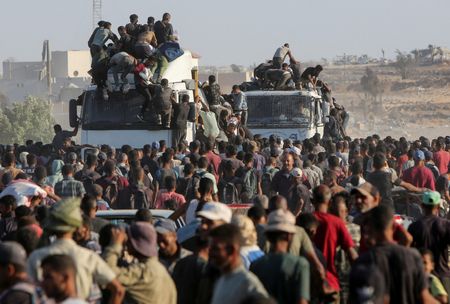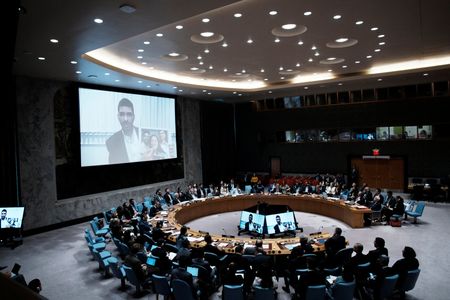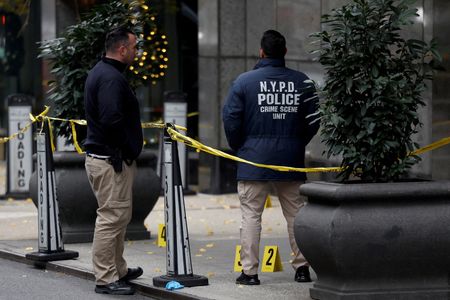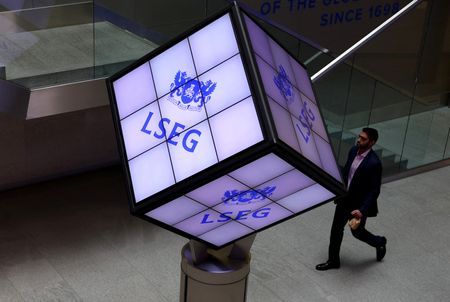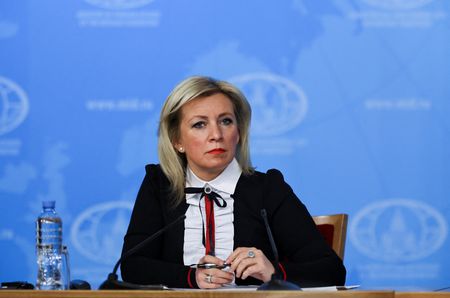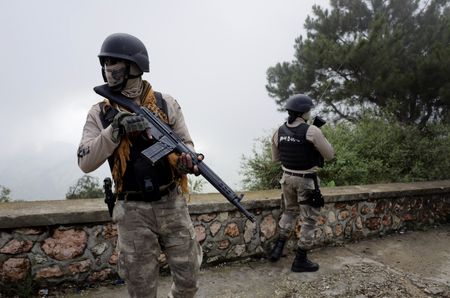By Alexander Cornwell and Nidal al-Mughrabi
TEL AVIV (Reuters) -Israeli Prime Minister Benjamin Netanyahu met senior security officials to finalise a new strategy for the nearly two-year war in the Gaza Strip, his office said on Tuesday, with media reporting he favoured a complete military takeover of the Israeli-occupied Palestinian territory.
Despite intense international pressure for a ceasefire to ease hunger and appalling conditions in the besieged enclave, efforts to mediate a truce between Israel and Palestinian militant group Hamas, which governs Gaza, have collapsed.
Local health authorities said at least 20 people were killed by Israeli gunfire as they waited for United Nations aid trucks in the northern Gaza Strip. In southern Gaza, 20 people were wounded by Israeli gunfire as they waited to get aid from U.N. aid trucks near Morag Square near Rafah, medics said.
Eight more people died of starvation or malnutrition in the last day, Gaza’s Health Ministry said, while at least 80 people were killed in the latest Israeli firing.
Netanyahu’s office said in a statement that the prime minister had held a “limited security discussion” lasting about three hours during which military Chief of Staff Eyal Zamir “presented the options for continuing the campaign in Gaza”.
An Israeli official had earlier told Reuters that Defence Minister Israel Katz and Strategic Affairs Minister Ron Dermer, a confidant of Netanyahu, would also attend the meeting to decide on a strategy to take to the cabinet this week. Israeli media reported on Tuesday that the cabinet would convene on Thursday at 6 p.m. (1500 GMT).
Israel’s Channel 12, citing an official from Netanyahu’s office, had said the prime minister was leaning towards taking control of the entire territory. That would reverse a 2005 decision to withdraw Israeli citizens and soldiers from Gaza, while retaining control over its borders, airspace and utilities, a move right-wing parties blame for Hamas gaining power there in the 2006 election.
It was unclear, however, whether Netanyahu was foreseeing a prolonged takeover or a short-term operation aimed at dismantling Hamas and freeing Israeli hostages. The prime minister’s office declined to comment on the Channel 12 report.
“It is still necessary to complete the defeat of the enemy in Gaza, release our hostages and ensure that Gaza never again constitutes a threat to Israel,” Netanyahu told new recruits at a military base. “We are not giving up on any of these missions.”
The U.N. called reports about a possible decision to expand Israel’s military operations throughout the Gaza Strip “deeply alarming” if true.
U.S. President Donald Trump declined to say whether the U.S., Israel’s closest military ally, supported Netanyahu’s plans.
“I know that we are there now trying to get people fed,” Trump told reporters. “As far as the rest of it, I really can’t say. That’s going to be pretty much up to Israel.”
On Saturday, Hamas released a video of the Israeli hostage Evyatar David, appearing emaciated in what seemed to be an underground tunnel. The images shocked Israelis and sparked international condemnation.
Throughout the war, there has been sustained international pressure on Hamas to release the remaining 50 people taken hostage in 2023, of whom Israeli officials estimate 20 are still alive. Most hostages have been released during ceasefires following diplomatic negotiations. Israel broke the last ceasefire.
PRESSURE TACTIC?
A Palestinian official said the suggestion of a full Israeli military takeover of Gaza may be a tactic to pressure Hamas into concessions, while the Palestinian Foreign Ministry urged foreign nations to take heed of the reports.
“The ministry urges countries and the international community to treat these leaks with utmost seriousness and to intervene urgently to prevent their implementation, whether these leaks are meant to exert pressure, test international reactions, or are genuine and serious,” it said.
Israel’s coalition government, the most right-wing and religiously conservative in its history, includes far-right politicians who advocate the annexation of both Gaza and the West Bank and encouraging Palestinians to leave their homeland. The International Court of Justice said in 2024 that Israel’s occupation of Palestinian territories is illegal and should end soon.
Nearly two years of fighting in Gaza have strained Israel’s military, which has a small standing army and has had to repeatedly mobilise reservists; some military leaders have warned against expanding the military occupation.
In a sign of differences between some members of Israel’s ruling coalition and the military, far-right National Security Minister Itamar Ben Gvir challenged military head Zamir to state he would comply with government directives even if a decision was made to take all of Gaza.
The statement from Netanyahu’s office said the Israeli Defence Forces were “prepared to implement any decision that will be made by the Political-Security Cabinet.”
HUNGER
The war was triggered when Hamas-led militants attacked Israeli communities and military bases near Gaza on October 7, 2023. About 1,200 people, including more than 700 civilians, were killed, and 251 hostages were taken to Gaza.
Israel’s military response has devastated the tiny, crowded enclave, killing more than 61,000 people, mostly civilians, according to Palestinian health authorities.
Israel’s campaign has forced nearly all of Gaza’s more than 2 million people from their homes and caused what a global hunger monitor called last week an unfolding famine.
Some 188 Palestinians, including 94 children, have died from hunger since the war began, according to Gaza authorities.
On Tuesday, Israeli tanks pushed into central Gaza, but it was not clear if the move was part of a larger ground offensive.
Palestinians living in the last quarter of territory where Israel has not yet taken military control, via ground incursions or demands for civilians to leave, said any new push would be catastrophic.
“If the tanks pushed through, where would we go, into the sea?” said Abu Jehad, a Gaza wood merchant. “This will be like a death sentence to the entire population.”
(Reporting by Maayan Lubell in Jerusalemn, Alexander Cornwell in Tel Aviv and Nidal al-Mughrabi in Cairo; Writing by Angus McDowall, Andrew Cawthorne, Alex Richardson and James Oliphant; Editing by Alison Williams, Alexandra Hudson, Rod Nickel and Alistair Bell)

